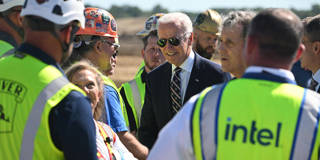Many countries’ recent experiences show that boosting manufacturing employment is like chasing a fast-receding target. Automation and skill-biased technology have made it extremely unlikely that manufacturing can be the labor-absorbing activity it once was, which means that the future of “good jobs” must be created in services.
CAMBRIDGE – The United States is on a building spree in semiconductors. In early April, Taiwan Semiconductor Manufacturing Company announced plans to set up a third fabrication facility in Arizona to make the world’s most advanced chips, upping its investment in the state to $65 billion. TSMC’s investment is heavily subsidized by the US government under the CHIPS and Science Act, and the company will receive $6.6 billion in grants and is eligible for $5 billion in loans. It can also claim an investment tax credit of up to 25% of its capital expenditures.

CAMBRIDGE – The United States is on a building spree in semiconductors. In early April, Taiwan Semiconductor Manufacturing Company announced plans to set up a third fabrication facility in Arizona to make the world’s most advanced chips, upping its investment in the state to $65 billion. TSMC’s investment is heavily subsidized by the US government under the CHIPS and Science Act, and the company will receive $6.6 billion in grants and is eligible for $5 billion in loans. It can also claim an investment tax credit of up to 25% of its capital expenditures.